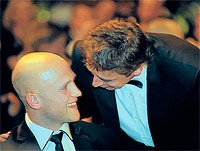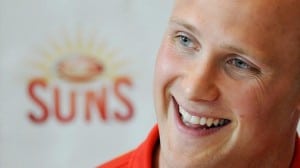
Ablett, incensed because he believes Thompson used his name “to take the focus of himself” during an Essendon media conference this week, said the flashpoint came when Thompson called the Brownlow Medallist into his office “about four or five rounds into the season”.
“He grabbed me in his office for a chat, but it was more, ‘Why haven’t you signed for the club?’ and I just said, ‘To be honest with you, Bomber, I’m not that comfortable discussing it with you. I’m still working through that with the club’,” Ablett said.
“I just felt that he’s the coach, I’m the player. Contracts shouldn’t be his role. But we had a pretty big argument there in his office, he walked out, I walked out, and he hasn’t really spoken to me since, to be honest.”
In round five, after Ablett was widely acknowledged as Geelong’s best player in the 26-point loss to Carlton, Thompson bluntly declared at the post-match press conference that “he might have looked OK”, but “I don’t think Gary had a great game today”.
When Thompson publicly chided his player several times during the season, Ablett suggested the club intervene because he felt it was fanning the flames of speculation about whether he would sign with Gold Coast.
“The feedback I got was that they were telling him that, but he was just running his own show,” Ablett said.
“It was disappointing that he took these little digs at me during the year, but I just tried to stay professional and didn’t answer any questions about it.”
Ablett said he had hoped the issue would fade away, particularly now both men were at new clubs. But he was annoyed that when Thompson held a media conference at Windy Hill on Tuesday, he took another swipe at Ablett.
“I just think it’s time he moved on, and stopped comparing his move to my move,” Ablett said.
“I didn’t really want to talk about it, but he keeps mentioning my situation, so I want to set the record straight.
“I find it a bit hypocritical that he can say I’ve done the wrong thing by Geelong. I made a decision at the end of my contract for my own reasons, he made a decision with a year left on his contract for his own reasons, but he’s still potting me instead of brushing it off.”

“The Gold Coast was about the challenge. Towards the end of this season, I felt like I wasn’t enjoying my football as much, and I needed to be challenged again,” he said.
“I love the Geelong Football Club, the people, the relationships, and that can never be taken away. But Gold Coast is a new club that’s being built from scratch, and I’ve got up here and I’m loving it.”
His great regret was that the current Geelong outfit had not managed to win a third premiership this year. He said he had tried to deal with the Thompson situation by redoubling his efforts to help the team to another flag.
“I thought, ‘I’m just going to play footy the best I can, play for the boys’, and if we didn’t have the relationship we used to have, so be it,” Ablett said.
“It’s hard when your senior coach is not talking to you about game plans and that sort of thing, but I dealt with the three other coaches – the midfield, forward and defensive coaches.
“I found it hard, because I’m the sort of person who just moves on quickly from arguments, forgive and forget. It did make it a long year.”
He said the strained relationship between himself and the coach had been discussed several times among the player leadership group, which had urged Ablett to put personalities to one side.
“The boys were supportive. Their advice was keep playing the best you can, make sure you do your team role, and if he’s going to act like that, that’s just the way he is,” Ablett said.
Part of the problem, Ablett felt, was that Thompson had tried to take on too much responsibility.
“Rather than just trying to be a coach, he was a very controlling person, trying to run the medical department, the contract negotiations, and if it wasn’t his way, it was nobody’s way,” he said.

